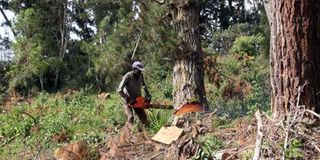Saw millers won’t fight logging ban despite huge losses

A lumberjack fells a tree inside Mt Kenya Forest on January 16, 2018. Saw millers will not fight the government’s ban on logging but have called for dialogue with stakeholders to deliberate on how to strengthen policies on forest management. PHOTO | NICHOLAS KOMU | NATION MEDIA GROUP
What you need to know:
- The government earlier this week imposed a three-month ban on logging following public outcry.
The ban came at a time the country has been hit by drought and acute drop in water levels in rivers.
- Saw millers had already paid over Sh37 million to the government to harvest trees in the forests.
Saw millers will not fight the government’s ban on logging but have called for dialogue with stakeholders to deliberate on how to strengthen policies on forest management.
Timber Manufacturers Association national chairman Bernard Gitau told the Nation that the saw millers had opted to swallow the bitter pill rather than fight the ban despite incurring losses in millions.
“It is not fair to us but we accept the ban. We will not engage in any fights over the ban but we will like to discuss with all stakeholders on the best way to strengthen policies regarding management of forests,” Mr Gitau said.
THREE-MONTH BAN
The government earlier this week imposed a three-month ban on logging following public outcry over the legally protected activity within state forests.
The ban came at a time the country has been hit by drought and acute drop in water levels in rivers.
Saw millers, according to Kenya Forest Service records, had already paid over Sh37 million to the government to harvest trees in the forests.
Further, since the ban was imposed, saw millers have been forced to lay off employees in the mills and the lumberjacks who were harvesting in the forests.
HUGE LOSSES
“We are incurring huge losses and not just from what was already paid but in the machinery that we have been forced to ground. All our employees have also been laid off,” Mr Gitau said.
Loggers, who were harvesting trees in Mt Kenya forests, were doing so under the protection of the Forest Conservation and Management Act of 2016.
The act allows the government to sell exotic trees planted in state protected forests through a competitive bidding system.
This section of the law allows the KFS to sell trees to the saw millers who pay the highest amount of money.
The timber manufacturers have also reiterated that they are not to blame for the environmental degradation saying every Kenyan has to play their part in conservation. They said they have always planted back what they harvested to ensure the forest cover is regained.
“What we harvest accounts for only 18 per cent of carbon gases removed from the atmosphere,” Mr Gitau argued.




